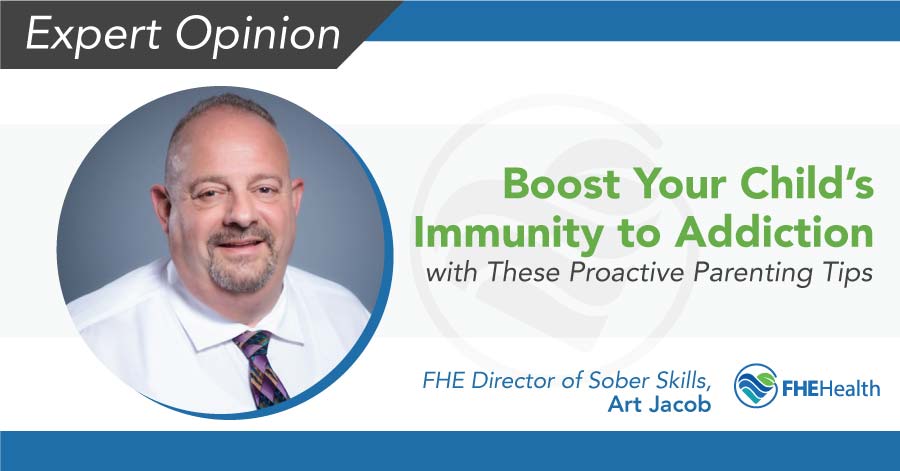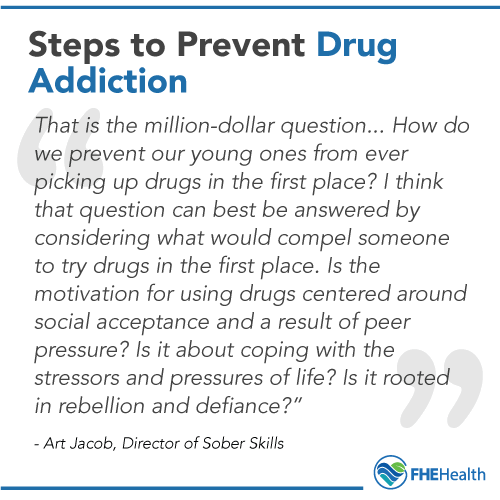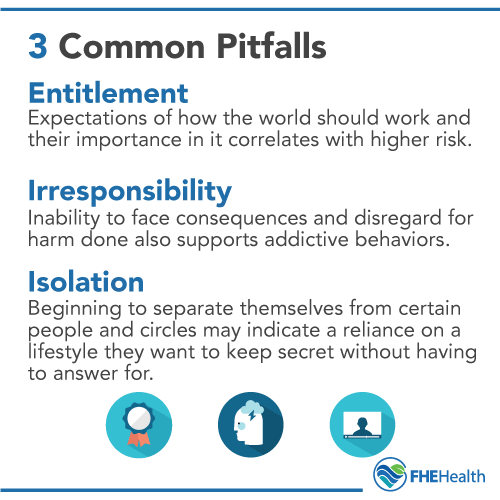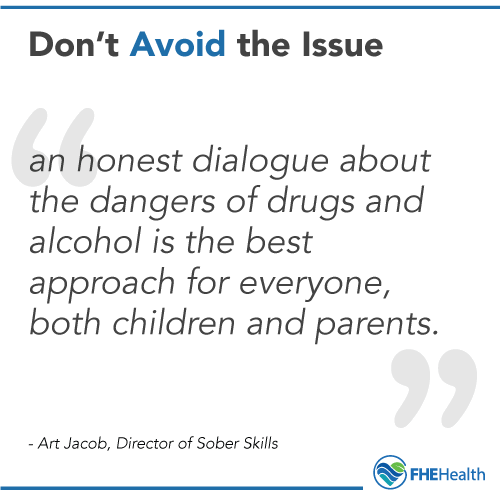
This article has been reviewed for accuracy by our peer review team which includes clinicians and medical professionals. Learn more about our peer review process.
No parent wants to see their child develop a drug or alcohol addiction. No mom wants to learn that her son lost his job or his marriage or both, because of a drinking problem. No dad wants to get the emergency call in the middle of the night letting him know that his daughter just overdosed on heroin. Such potential scenarios are any parent’s worst nightmare— and a natural incentive to be proactive about substance abuse prevention before drugs and alcohol have entered a child’s peer and school environment.
But parents don’t always know what proactive parenting looks like when it comes to prevention of drug abuse, asking things like: “What can I do to prevent drug addiction?” … “How do I raise my child so that they “say ‘no’” to drugs?” … “How do you talk to your kids about addiction?” Such questions are especially common among parents with a family or personal history of addiction. They naturally want to be proactive about addressing the dangers of addiction before potential warning signs appear.
Thankfully, there are people like Art Jacob who have the personal and professional expertise to answer their questions. As Director of Sober Skills at FHE Health, Jacob leads and manages a 12-step immersion program for patients who are fresh out of rehab and want a higher level of ongoing recovery support. (The Sober Skills program provides them with a safe and supportive, 12-step community and a highly structured residential environment.)
How to Prevent Drug Addiction in Your Child
 In a recent interview, we asked Jacob what tips he’d give to parents who want to raise their child to “say ‘no’” to drugs. “That is the million-dollar question,” he said. “How do we prevent our young ones from ever picking up drugs in the first place? I think that question can best be answered by considering what would compel someone to try drugs in the first place. Is the motivation for using drugs centered around social acceptance and a result of peer pressure? Is it about coping with the stressors and pressures of life? Is it rooted in rebellion and defiance?”
In a recent interview, we asked Jacob what tips he’d give to parents who want to raise their child to “say ‘no’” to drugs. “That is the million-dollar question,” he said. “How do we prevent our young ones from ever picking up drugs in the first place? I think that question can best be answered by considering what would compel someone to try drugs in the first place. Is the motivation for using drugs centered around social acceptance and a result of peer pressure? Is it about coping with the stressors and pressures of life? Is it rooted in rebellion and defiance?”
Jacob, who has successfully been in recovery for more than 16 years, can speak with personal authority about the motivations that may lead a kid at an impressionable age to begin drinking and using drugs. In his case, experimentation with alcohol began at the age of 13 at a school dance: “I was at a school dance and loaded with insecurities, boredom, anxiety, fears, loneliness….”
That’s when a couple of guys invited him to join them in the woods with “a case of Milwaukee Tall Boys,” and instantly “these are my new friends, I drink the beers and all of a sudden, the magic happened: the restlessness, irritability, fears, insecurities, anxieties all went away, and I felt I had a solution to my internal condition. I was able to go on the dance floor without consequences or any trouble and had a blast— and from that point on, I said ‘I’m going to do this from now on.’”
As Jacob sees it, alcohol became “the solution” to those childhood addiction triggers—the difficult and painful roller coaster of emotions he was experiencing at that point in his life.
The lesson for parents who want to be proactive in preventing addiction in their children: that understanding a child’s individual reasons or motivations for using drugs can be the pathway to “resolving the underlying issues or motivations that make experimenting with harmful substances seem like an attractive option.”
Ultimately, the goal should be helping your child find healthy solutions to the challenges they may be facing internally or externally, so that drugs and alcohol aren’t even an option they would want to consider as “the solution.”
How to Talk to Your Child About Drugs and Alcohol
Jacob is now a dad who, like most parents, has a healthy level of concern about how his child will navigate the drug and alcohol scene in high school and beyond, especially when marijuana will now be legal in addition to alcohol in many parts of the country. Jacob said he first started talking with his son about drugs and alcohol when his son was around seven or eight years of age. Since that time, Jacob has had “a lot of talks” with his son. He has emphasized, “what drugs and alcohol can do to you.” He has also educated his son about the dangers of peer pressure. And, he has tried to keep an open line of communication, so that in addition to education, he is offering honesty, transparency, and trust— all “key elements” in preventing substance abuse.
3 Common Pitfalls to Watch for in Your Child
 What are common pitfalls to watch for that could indicate your child is at greater risk of addiction? Jacob listed three: “entitlement, irresponsibility and isolation.” If your child is exhibiting behaviors associated with entitlement, irresponsibility and isolation, they may be more prone to choosing a “quick fix” like drugs or alcohol in the face of life’s challenges.
What are common pitfalls to watch for that could indicate your child is at greater risk of addiction? Jacob listed three: “entitlement, irresponsibility and isolation.” If your child is exhibiting behaviors associated with entitlement, irresponsibility and isolation, they may be more prone to choosing a “quick fix” like drugs or alcohol in the face of life’s challenges.
In these circumstances, you can’t change your children. You can talk with them, Jacob said, noting that you can also help your child “learn how to navigate a challenging and demanding world without needing to resort to quick fixes to make them feel better.”
How to Help a Child with a Family History of Addiction
Jacob is quick to emphasize “there is a genetic piece to addiction.” He also suspects, based on his own experience working with people in recovery, that “certain personality types are more prone to addiction.”
With these children who are more prone to addiction, Jacob is matter-of-fact that parents need to accept there is only so much they can do to prevent addiction from developing. In these situations, he nonetheless encourages “communication and education” as “our best assets,” regardless.
Parenting Strategies That May Have Prevented Addiction Among Our Patients?
This was a tough question to answer, since it involves a good deal of “what if” speculation. What wasn’t helpful, however, was parents “avoiding the issue,” according to Jacob. He said “an honest dialogue about the dangers of drugs and alcohol is the best approach for everyone, both children and parents.”
How Addiction Is a Learned Behavior – Not Just Genetic
 Another point of consideration for any parent who may currently be struggling with drugs and alcohol: that addiction isn’t just genetically inherited; it’s also learned behavior. Jacob cited research that suggests that the children of addicted parents are far more likely to become addicts themselves than the children of non-addicted parents.
Another point of consideration for any parent who may currently be struggling with drugs and alcohol: that addiction isn’t just genetically inherited; it’s also learned behavior. Jacob cited research that suggests that the children of addicted parents are far more likely to become addicts themselves than the children of non-addicted parents.
What this means is that if you have a drug or alcohol problem, the best thing you can do to protect your child from developing an addiction is to get immediate treatment. You’ll also be teaching your child that addiction is a treatable and manageable disease— so that if they ever do develop a substance abuse problem, they will be more likely to get help.






